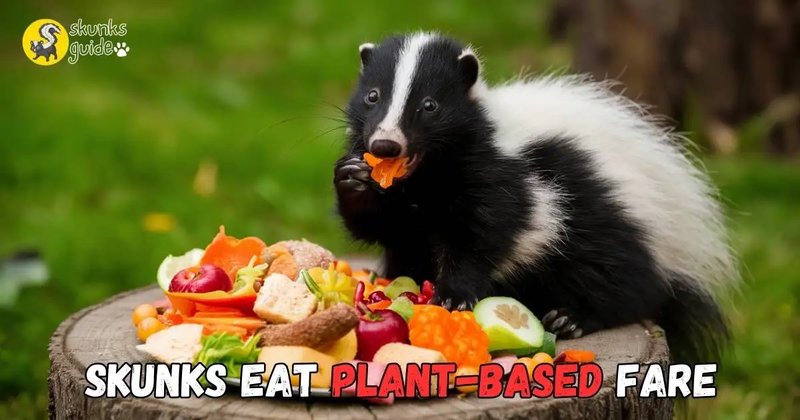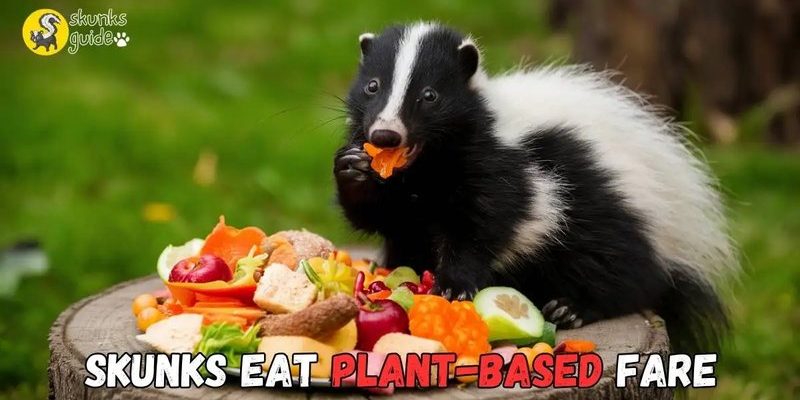
Skunks, often seen rummaging through gardens or scavenging in trash cans, are omnivorous. This means they eat both plants and animals, making them quite adaptable. They have a diverse diet that reflects their resourcefulness and skill. Think of them as culinary adventurers, always on the lookout for their next meal. Understanding what skunks eat and how they hunt not only helps us appreciate these creatures but also gives us insights into their behavior and ecological role.
Understanding Skunk Diets
Skunks are opportunistic eaters, which means they’ll eat whatever is available. Their diet typically includes a mix of the following:
- Insects: Beetles, crickets, and grasshoppers are staples in their diet.
- Fruits and Vegetables: Berries, apples, and corn provide a tasty treat.
- Small Animals: They’ll munch on small rodents, frogs, and even birds if they get the chance.
- Carrion: Skunks aren’t picky; they’ll eat dead animals if they find them.
Here’s the thing: skunks have excellent senses of smell, which helps them find food. They can sniff out a meal from quite a distance. Imagine being able to tell what’s for dinner just by the scent in the air! This keen sense not only leads them to tasty bites but also keeps them safe from potential predators when they’re foraging.
The Role of Insects in Their Diet
Insects play a significant role in a skunk’s diet. Skunks are natural pest controls, helping to keep insect populations in check. During warmer months, they can eat large quantities of insects, which is not just beneficial for them but also for gardens and crops. For instance, a skunk might find a buffet of beetles in your backyard, munching away and preventing them from devouring your plants.
Interestingly, skunks have certain preferences when it comes to insects. They tend to favor larger insects, like grubs and larvae, because they provide more nutrients. Plus, these critters are often easier to find since they tend to hide in the soil or beneath debris. It’s like having a secret stash of delicious snacks hidden away!
How Skunks Use Their Senses to Hunt
Skunks are equipped with a few tricks up their sleeves when it comes to hunting. Along with their incredible sense of smell, they have sharp hearing and can detect movements, which helps them locate prey. You might be wondering how they manage to catch quick animals, right? Here’s how:
1. Stealthy Approach: Skunks are low to the ground and can sneak up on their prey. They move quietly, which is crucial when stalking food.
2. Patient Wait: Instead of chasing after their meals, skunks often wait for the right moment to strike. They’ll sit still, observing their surroundings before making a move.
3. Quick Reflexes: When they do decide to pounce, they’re surprisingly quick! They can catch small animals like mice or a careless bird if they get the chance.
This hunting strategy is really about being smart and patient. It’s like sitting at your favorite fishing spot, waiting for the perfect catch!
The Importance of Plant Matter in Their Diet
Skunks don’t just rely on protein for their nutrition; plant matter is equally important. In the fall, for example, fruits and nuts become a significant part of their diet. Apples, acorns, and berries provide essential vitamins and sugars. You could say that skunks enjoy a well-rounded diet!
Eating fruits and vegetables also supports skunk health, especially in colder months when animal prey is less abundant. Think of it as a survival strategy—by munching on plants, skunks ensure they have the nutrients they need to thrive, even when their usual protein sources are scarce.
Seasonal Changes and Skunk Diet
Skunk diets can change with the seasons, adapting to what’s available. In spring, they typically have access to fresh greens and insects, while summer allows for a bounty of fruits and vegetables. Come fall, skunks hustle to prepare for winter by storing up on high-calorie foods like nuts.
During winter, skunks tend to be less active, often going into a state of semi-hibernation. They might not eat as often, but they still venture out to find any remaining food sources. It’s like the skunk is preparing for a long winter’s nap while ensuring they have enough energy stored to get through until spring.
Skunks as Scavengers
Another interesting aspect of skunk behavior is their scavenging habits. In many ways, they’re like the clean-up crew of the animal kingdom. If a skunk comes across a dead animal, they won’t hesitate to feast on it. This helps dispose of carrion, which can prevent the spread of disease in the ecosystem.
Being scavengers also means that skunks play a crucial role in their habitats. They contribute to nutrient cycling by eating leftovers and then dispersing seeds through their droppings. This behavior creates a healthier environment for other plants and animals. So, while we might think of skunks as cute yet pesky critters, they have an essential role in maintaining balance in their ecosystems.
The Impact of Human Environments on Skunk Diets
Skunks often thrive in urban areas, where they find plenty of food. Trash cans can become smorgasbords, offering easy access to scraps. This adaptability is a testament to their resourcefulness. However, this also puts skunks at risk. Eating human food can lead to health issues, including obesity and disease.
Interestingly, the shift toward human-dominant environments can also change their behavior. Skunks in urban areas may become bolder, often foraging during the day rather than at night. This shift can lead to more encounters with humans, which isn’t always ideal for either party.
So, while we might enjoy watching these animals from a distance, it’s essential to keep our garbage secured and avoid feeding them, helping maintain their natural diet.
In summary, skunks are much more than just their famous defense mechanism. They have complex diets that reflect their adaptability and intelligence in finding food. By understanding their eating habits and hunting strategies, we can appreciate their role in the ecosystem a bit more. Just like a hearty meal shared among friends, the diet and strategies of skunks remind us of the interconnectedness of all living things. They are truly remarkable creatures that play vital roles in both urban and natural settings.

